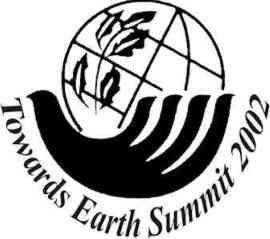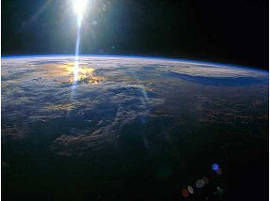Introduction
 The World Summit on Sustainable Development organised by the United Nations (UN) in Johannesburg was held in August and September of 2002. Also called Earth Summit 2002, it brought together over 100 heads of state and 40,000 delegates to try and set up the goals needed to halt poverty around the world whilst saving the environment at the same time.
The World Summit on Sustainable Development organised by the United Nations (UN) in Johannesburg was held in August and September of 2002. Also called Earth Summit 2002, it brought together over 100 heads of state and 40,000 delegates to try and set up the goals needed to halt poverty around the world whilst saving the environment at the same time.
Facts
Here are a few facts on Earth Summit 2002:
- It was the largest UN conference to date, with over 100 heads of state and 40,000 delegates attending.
- It covered everything from measures to cut poverty, improve sanitation, improve ecosystems, reduce pollution, and improve energy supply for poor people.
- It fell exactly 10 years after the Earth Summit in Rio de Janeiro which focused world governments on environmental issues for the first time.
- Two weeks of preparatory meetings took place in Bali, Indonesia to reach agreements on the key plans that could be realistically met.
- Kofi Annan, the UN Secretary General, put water, energy, health, agriculture and biodiversity at the top of his list of commitments from the summit.
- South Africa, the host of Earth Summit 2002, planned to provide clean water to all South Africans by 2008, having already created access for 7 million of the poorest people since 1994. However, in 2008 approximately 5 million people in South Africa were still without access to water and 15 million had no access to basic sanitation.
- The European Union (EU), which currently spends 1.4 billion euros (£880 million) on water projects worldwide each year, planned to focus particularly on water supply and sanitation in Africa, boosting management of water resources and providing better coordination of water-related development aid. According to a 2014 report of the African
Working Group of the European Union, following on from 2002, many European states and African countries now have specific sanitation or overarching policies related to sanitation.
Summit Agreements
The summit also aimed to make agreements for the following issues:
- To cut by half by 2015 the proportion of people living on less than $1 a day.
- To cut by half by 2015 the number of people suffering from hunger.
- To cut by half by 2015 the 1.1 billion people without access to safe drinking water.
- To cut by a significant amount the 2.4 billion people who live without inadequate sanitation, and improve sanitation in institutions, such as schools; and promote safe hygiene.
- To launch an action programme to reduce the number of people who lack access to modern energy.
- To improve the living standards for at least 100 million people who live in slums, by 2020.
- To adopt and implement policies and measures that will promote sustainable production and consumption, using the "polluter-pays" principle.
- To increase corporate, environmental and social responsibility and accountability.
- Establish programmes for energy efficiency in poor countries.
- Promote waste prevention and reduction by encouraging production of reusable goods and biodegradable products.
- Implement programmes against deforestation, erosion, land degradation, loss of biodiversity and disruption of water flows.
- Promote the development of sustainable tourism.
- Put particular emphasis on development in Africa.
- Develop programmes to reduce by two-thirds by 2015 the mortality rates for children under the age of five.
In 2012 several Heads of State and Government met in Brazil to 'renew our commitment to sustainable
development and to ensuring the promotion of an economically, socially and environmentally
sustainable future for our planet and for present and future generations.'
Criticisms
 The Earth Summit 2002 programme has not escaped criticism, however. Many environmentalists say that the richer nations, which have the means, do not do enough to implement measures that would help the 1.2 billion people living in poverty and clean up the planet.
The Earth Summit 2002 programme has not escaped criticism, however. Many environmentalists say that the richer nations, which have the means, do not do enough to implement measures that would help the 1.2 billion people living in poverty and clean up the planet.
But EU Environment Commissioner Margot Walstrom warned: "We won't have time to go and solve all problems."
"I'm afraid that the ultimate loss could be the loss of this whole concept of sustainable development because people would then be able to say it doesn't work, it doesn't work in practice, you cannot translate it into something concrete," she added.
Environmentalists have noted another drawback: US President George Bush has not yet confirmed that he will attend.
"President Bush cannot afford not to be there, nobody will understand if he doesn't show up," said Jan Pronk, U.N. Secretary-General, Kofi Annan's special envoy to the Earth Summit.
"It would be a great pity if he does not come," Pronk told Reuters in an interview. "Many others are coming. The Europeans are coming in big numbers, along with Third World countries, eastern European countries and central European countries."
However, Pronk remains optimistic and said: "I have good hopes that there will be agreement on a plan of action, and secondly there will be commitments...to specific programmes and resources."
He also said that the underlying aim of halving world poverty by 2015 needed some immediate short-term measures as up to 14 million people in southern Africa face starvation.
"There is a request of about $600 million (£383 million) in order to make resources available to help the 12-13 million people which may be a victim of this famine," he said.
Credits
Image: Earth Summit 2002 by Dominic Alves
Information sourced from:
The Water Project (2015), Water in Crisis – South Africa [online], Available from: http://thewaterproject.org/water-in-crisis-south-africa [accessed 03/06/2015].
The Encyclopedia of Earth (2007), World Summit on Sustainable Development (WSSD), Johannesburg, South Africa [online], Available from: http://www.eoearth.org/view/article/157161/ [accessed 18/06/2015]
United Nations (2012), Report of the United Nations Conference on Sustainable Development [online], Available from: http://www.uncsd2012.org/content/documents/814UNCSD%20REPORT%20final%20revs.pdf [accessed 03/06/2015]
 The World Summit on Sustainable Development organised by the United Nations (UN) in Johannesburg was held in August and September of 2002. Also called Earth Summit 2002, it brought together over 100 heads of state and 40,000 delegates to try and set up the goals needed to halt poverty around the world whilst saving the environment at the same time.
The World Summit on Sustainable Development organised by the United Nations (UN) in Johannesburg was held in August and September of 2002. Also called Earth Summit 2002, it brought together over 100 heads of state and 40,000 delegates to try and set up the goals needed to halt poverty around the world whilst saving the environment at the same time.
 The Earth Summit 2002 programme has not escaped criticism, however. Many environmentalists say that the richer nations, which have the means, do not do enough to implement measures that would help the 1.2 billion people living in poverty and clean up the planet.
The Earth Summit 2002 programme has not escaped criticism, however. Many environmentalists say that the richer nations, which have the means, do not do enough to implement measures that would help the 1.2 billion people living in poverty and clean up the planet.